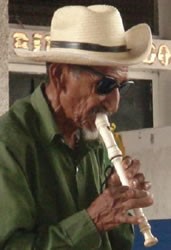Pipil in El Salvador

Photo Source:
Anonymous
|
Send Joshua Project a map of this people group.
|
| People Name: | Pipil |
| Country: | El Salvador |
| 10/40 Window: | No |
| Population: | 12,000 |
| World Population: | 12,000 |
| Primary Language: | Nahuat |
| Primary Religion: | Christianity |
| Christian Adherents: | 96.00 % |
| Evangelicals: | 2.00 % |
| Scripture: | New Testament |
| Ministry Resources: | No |
| Jesus Film: | No |
| Audio Recordings: | Yes |
| People Cluster: | Central American Indigenous, other |
| Affinity Bloc: | Latin-Caribbean Americans |
| Progress Level: |
|
Introduction / History
The ancestors of the Pipil migrated from central Mexico. That's why they speak one of the Nahuat languages which are much more common in Mexico. In the 1500s, commercial agriculture was displacing the Pipil people from their lands, so they went to the countryside. Some worked for less prestigious Spanish ranchers and farmers. The Pipil were also dying from European-introduced diseases at an alarming rate.
The Pipil revolted a number of times, first against the Spanish Empire, then later against the local government. In 1932 there was a slaughter of them known as La Matanza. Anyone who even looked indigenous was killed. After that, the Pipil dressed like the Salvadorians.
What Are Their Lives Like?
Almost all indigenous peoples in El Salvador, including the Pipil, are somewhat blended with the Spanish speaking population. There are Mestizos (mixed Native American and Spanish) and those who are wholly in the Spanish speaking community. However, there is an effort to resurrect indigenous languages and cultures in El Salvador.
What Are Their Beliefs?
The Pipil are almost entirely Roman Catholic. Some are Protestant.
What Are Their Needs?
The Pipil people need faith in the direction and the work of Jesus Christ. They need his guidance.
Prayer Points
Pray for a spiritual hunger that will give the Pipil a desire to embrace Christ as lord and savior.
Pray for Pipil disciples who will make more disciples.
Pray for the Lord to bless them economically and spiritually so they will experience his love and power.